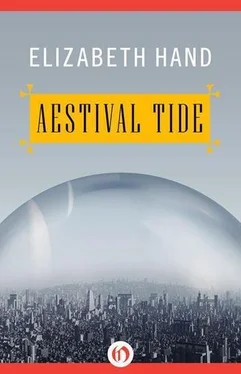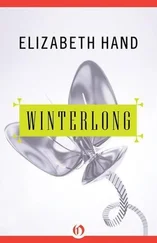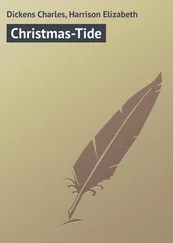Elizabeth Hand - Æstival Tide
Здесь есть возможность читать онлайн «Elizabeth Hand - Æstival Tide» весь текст электронной книги совершенно бесплатно (целиком полную версию без сокращений). В некоторых случаях можно слушать аудио, скачать через торрент в формате fb2 и присутствует краткое содержание. Жанр: Фантастика и фэнтези, на английском языке. Описание произведения, (предисловие) а так же отзывы посетителей доступны на портале библиотеки ЛибКат.
- Название:Æstival Tide
- Автор:
- Жанр:
- Год:неизвестен
- ISBN:нет данных
- Рейтинг книги:3 / 5. Голосов: 1
-
Избранное:Добавить в избранное
- Отзывы:
-
Ваша оценка:
- 60
- 1
- 2
- 3
- 4
- 5
Æstival Tide: краткое содержание, описание и аннотация
Предлагаем к чтению аннотацию, описание, краткое содержание или предисловие (зависит от того, что написал сам автор книги «Æstival Tide»). Если вы не нашли необходимую информацию о книге — напишите в комментариях, мы постараемся отыскать её.
Philip K Dick Award (nominee)
Æstival Tide — читать онлайн бесплатно полную книгу (весь текст) целиком
Ниже представлен текст книги, разбитый по страницам. Система сохранения места последней прочитанной страницы, позволяет с удобством читать онлайн бесплатно книгу «Æstival Tide», без необходимости каждый раз заново искать на чём Вы остановились. Поставьте закладку, и сможете в любой момент перейти на страницу, на которой закончили чтение.
Интервал:
Закладка:
In this hallway the light tubes flickered a paler blue, the diatoms fed a lower algae content. Aquariums were set into the curved walls, long narrow tanks and smaller round ones, some with cracks where the Architects had not accounted for the diurnal contraction in the polymers that formed the walls. Luminous fish floated in black water, green water, water of deepest blue. Anglerfish with glowing crab-shaped lures protruding from their skulls; delicate fairypipes, their skeletons luminous pink; lightning fish spearing their tanks with brilliant arrows. The tanks had been tended for hundreds of years. Many of these creatures were extinct now, Outside. Their keepers could no longer recall why it was they cared for them.
The gynander walked here slowly. She loved these things, and the other half-human heteroclites that had been engineered in the nucleovats and cellular refineries of Dominations. Strange things, stranger than the gynander herself, things from the First Days.
Things like Zalophus.
Ahead of her the ceiling arched, and the passage split into two wide corridors. To the right the hall curved down to where the ghoulish aardmen were bred, and the birdlike argalæ, and the arboretums where sentient plants caressed passersby with slender branches. Reive grimaced. The soft, steady pumping of the ventilation system wafted the pungent scent of the argalæ’s excrement, nitrogen-rich and processed for fertilizer. She took the left-hand fork.
This was the final descent to the oceanic vivariums, where the biotechnicians imprisoned the genetically enhanced whales and sirens, the white-beaked telepathic inia and other dolphins, the manatees and orcas and half-human hydrapithecenes and, most ancient of all, sweet-voiced Zalophus, who would lure unwary visitors to his tank and devour them.
The corridor widened into a vast space, a sort of cavern that fed into the gulf Outside. Huge barred gates rose to the ceiling, allowing water to pass through the intricate system of weirs and nets and canals that supplied the open-air tanks. Mingled with the rush of waves sighing in and out were the explosive sounds of sirens breaching, the inquisitive whistles of dolphins, the soft insistent lies of the hydrapithecenes in their solitary enclosures.
“Free us,” they sang after Reive as she passed. She ignored the faces gazing at her from the depths. Faces from a nightmare, some of them, gilled and bearded with long fleshy tubes, or scaled like fish. Others more like their human ancestors, but with moist skin of palest peach or blue. Their lipless mouths twisted furiously, revealing the rows of razor teeth within, the suckers oozing toxins like ink through the water.
“Free yourself,” the gynander called airily; but she ran as one bearded siren smashed itself against the glass walls of its cage, blood swirling from its mouth as it screamed after her.
She met no one else. It was midnought, the middle of the thirty-two-hour day regulated by the Architects. On the levels above her, the Orsinate and their pleasure cabinet were still abroad, playing in the eternal twilight. On the levels below the workers would be rising, the ’filers on Powers readying for another broadcast day, the moujiks and rasas stumbling toward the refineries and medifacs. But here Reive was alone. She talked to herself, absently whispering invocations against Ucalegon, repeating the words she had replied to the plum-skinned boy’s inquisition. She stopped to call to the dolphins, leaning down to graze her fingers against their smooth heads as they butted against the sides of their tank. They whistled plaintively when she left, then returned to their endless circuits of their prisons.
In the center of the chamber was Zalophus’s pool, the largest in the vivarium, and the oldest. A marvel of the ancient engineers, it was rumored to plunge to unimaginable depths, to the Undercity itself, where the great whale slept and brooded, dreaming his endless dreams of hunger and escape. The Architects had designed his cage to resemble a huge grotto. Their memory files recalled such things; none of the Ascendants or the biotechnicians who toiled on Dominations had ever seen the lush green places Outside that inspired it. Boulders of molded, resin and real plants—bougainvillea, honeysuckle, purple eelgrass—cascaded beneath the brilliant growth lamps. Sea urchins nestled in a cleft between strands of kelp and sea fern. On one of the false boulders a cormorant perched drying its wings. It regarded Reive with one tangerine-colored eye and snapped its beak. She wondered if it had come from the labs, then shivered at the thought that it might be from Outside. Hastily she dipped her head and touched the whorls on her breast that formed the ward against Ucalegon.
A moment later she stopped at the edge of the pool. A heat fence separated her from its occupant. The gynander whistled softly to herself, shading her eyes against the growth lights. When she inhaled, waves of warm scent washed over her: salt and sea lavender, coconut oil and almond flower, an underlying musk like semen. She shut her eyes. It made her think of the long slant of beach outside the city, the rust-colored sand and impossibly blue water that she had seen only once before at Æstival Tide, ten years earlier when she was a very small child. There was a smell like burning roses and she could hear the Daughters of Graves singing, see the Orsinate standing stiffly on their viewing platform, tossing ginger blossoms and the dried leaves of sweet cicely onto the crowd below.
Her hands had already begun to stretch through the heat fence when a deep voice crooned, “You’ll harm yourself, human child. Come here to this side, where it’s open—”
Reive gasped. Her hands stung where the fence had burned them.
“Zalophus!” She tried to keep her voice from shaking, tried to smile.
In the dark water in front of her he hung suspended. All she could see was his head, like one of the gargoyles upon the facade of the Church of Christ Cadillac. Huge, grotesquely pitted and scarred by centuries of bashing against the concrete walls of his prison, his blunt snout ended in a mouth that held white teeth longer than her hand. A long furrow ran the length of his skull, hiding his blowhole. A flap of warted skin folded back from it when he breached. To either side of that knobbed dome glittered his eyes. Eyes larger than Reive’s clenched fists, liquid eyes, eyes so dark it was impossible to tell what color they were, if they had a color at all. They stared at her calmly; at least she supposed it was calmly—his eyes revealed nothing, just as his voice seldom changed. So deep a voice that it seemed he moved other creatures to his will by speaking, his voice alone manipulating their frailer skeletons. But Reive believed there was something else at work there as well, some subtle telepathy by which he bent the waves of air and water and made of them a web to snare the careless.
Ancient Zalophus, sweet-voiced Zalophus: Zalophus the ever-hungry.
“There was a siren here this morning,” the great cetacean boomed. Reive stepped back and covered her ears. “She wept, remembering when the seas were full of her kind, and men worshipped them and made them offerings of stillborn children.”
“She lied,” said Reive, dropping her hands. “The seas were never full of them, they were engineered here a hundred years ago. They have never seen open water.”
“So sad, she was so sad,” Zalophus moaned, sending up a plume of dark green spray. “I ate her.”
Reive laughed, covering her mouth. Zalophus stared at her with huge unblinking eyes. Then, without warning he breached. With a cry Reive stumbled backward. For an instant she glimpsed the rest of him, long body like a whale’s, but with narrower fins and tail, great pits gouged in his rubbery flesh by the crab-sized sea lice that scurried frantically across his back as he crashed into the water. The cormorant shrieked and flapped into the air. A headier smell overwhelmed Zalophus’s sweet scent, brackish, the odor of rotting fish. He disappeared beneath the surface, the water boiling and clouded where he had been. She could just make out his form far below, like a cavern in the deep water.
Читать дальшеИнтервал:
Закладка:
Похожие книги на «Æstival Tide»
Представляем Вашему вниманию похожие книги на «Æstival Tide» списком для выбора. Мы отобрали схожую по названию и смыслу литературу в надежде предоставить читателям больше вариантов отыскать новые, интересные, ещё непрочитанные произведения.
Обсуждение, отзывы о книге «Æstival Tide» и просто собственные мнения читателей. Оставьте ваши комментарии, напишите, что Вы думаете о произведении, его смысле или главных героях. Укажите что конкретно понравилось, а что нет, и почему Вы так считаете.












